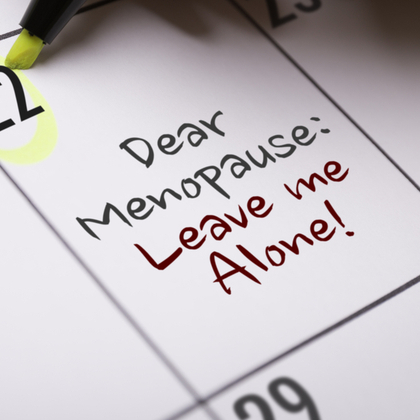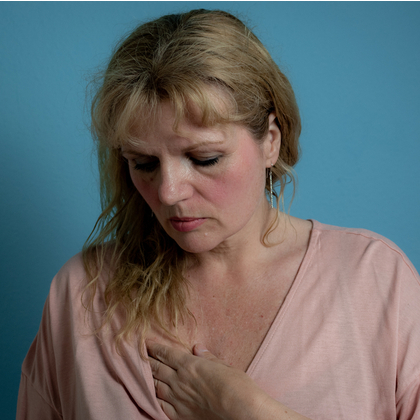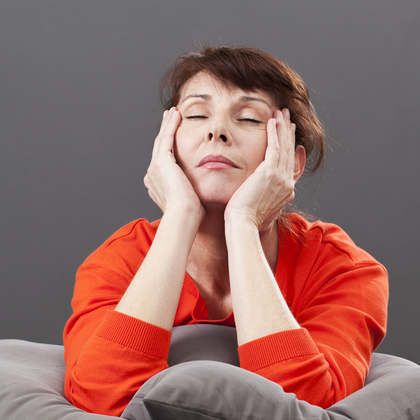
The menopause doesn’t happen overnight. It’s a gradual and natural process characterised by the progressive decline in your female sex hormones, marking the end of your reproductive years.
You officially reach the menopause when you haven’t had a period for 12 consecutive months. This usually occurs between the ages of 45 and 51, although some women may have an early or premature menopause due to health complications (1).
What are the stages of the menopause?
The menopause is complex and multi-layered; it has different stages with varying signs. As with anything hormonal, there’s no one-size-fits-all experience of it, and some women contend with every symptom; others don’t.
Perimenopause

The perimenopause means ‘around menopause’. This time is known as the menopausal transitional phase because it occurs before you reach the menopause officially. Symptoms that are often associated with the menopause — hot flashes, mood swings, intimate dryness, fatigue — actually happen during the perimenopause.
Menopause
You reach menopause when your ovaries no longer release an egg each month or produce as much oestrogen. Menopause is official when you haven’t had a period for 12 consecutive months. In the UK, most women experience this around the age of 51 (2).
Postmenopause
Postmenopause follows your last period. Essentially, this stage quantifies the rest of your life after menopause. During this phase, perimenopausal symptoms, such as mood swings and hot flushes, tend to ease. But, of course, every woman is different. Some women may continue to experience symptoms for several years after the transition.
Due to lower oestrogen levels, postmenopausal women have an increased risk of certain health conditions, like heart disease and osteoporosis. These can arise because oestrogen serves countless protective roles in the body, and the reduced production of it affects lots of other areas.
How do I know if I’m going through the menopause?
Generally speaking, the first sign of perimenopause is a change in your periods, most women notice that the frequency of their period changes, but you may also notice heavier or unusually light periods. For instance, you may have a heavy menstrual bleed every 2-3 weeks, or, you may not have them for months at a time.
Symptoms of perimenopause
In addition to menstrual irregularities, you may experience a range of perimenopausal symptoms. Around 8 in 10 women contend with some of the symptoms below (3):
-
Night sweats (hot flushes that occur at night)
-
Reduced sex drive (libido)
-
Headaches
-
Vaginal pain and dryness, itching or discomfort during sex
-
Palpitations – your heartbeat becomes more noticeable
-
Recurrent urinary tract infections
-
Joint stiffness, aches and pains
-
Mood changes, such as anxiety, low mood or panic
-
Brain fog, forgetfulness, and difficulty concentrating
-
Weight gain
-
Hair loss or thinning
-
Dry skin, dry eyes or dry mouth
-
Bleeding gums
These symptoms are the result of your ovaries producing less oestrogen, and the increased fluctuations in your hormone levels. If these symptoms are severe and impacting your everyday life, you should speak to your GP.
Some women continue to experience some of the symptoms above even after they have officially reached the menopause, most commonly hot flushes and night sweats, mood changes and insomnia.
How long does the perimenopause last?
On average, most symptoms of the perimenopause last between 4 and 8 years. However, around 1 in 10 women experience symptoms for up to 12 years (4).
How is the menopause diagnosed?
Doctors can use a combination of tools to effectively determine whether you have reached the menopause, but the two aspects they are most likely to focus on are your menstrual bleeding patterns and any perimenopausal symptoms you’re experiencing.
If you’re in your late 40s or early 50s and experience infrequent or occasionally miss periods, and experience other perimenopausal symptoms, your doctor has enough information to diagnose menopause. Urine or blood tests are unnecessary.
If, however, you’re younger than 40, or between the ages of 40 and 45, your doctor may give you a blood test to diagnose early or premature menopause. This blood test measures levels of follicle-stimulating hormone (FSH), which is higher in menopause as your ovaries are no longer producing eggs.
Other considerations
Many women going through the menopause report a general ‘malaise’, complaining they feel sluggish and not quite themselves.5 However, it’s important to avoid self-diagnosing, assuming that any significant physical and emotional changes are due to the perimenopause.
Other health conditions can trigger similar symptoms to the perimenopause, so always talk to your doctor if you begin to notice these changes.
Found this article useful? Please browse the rest of our Menopause hubfor more helpful information.
References:
-
nhs.uk. 2020. Menopause. Available online: https://www.nhs.uk/conditions/menopause/
-
nhs.uk. 2020. Menopause. Available online: https://www.nhs.uk/conditions/menopause/
-
Bridgewater.nhs.uk. 2020. The Menopause. Available online: http://www.bridgewater.nhs.uk/wp-content/uploads/2014/02/The-Menopause-what-to-expect-when-you-are-expecting-the-menopause.pdf
-
nhs.uk. 2020. Menopause. Available online: https://www.nhs.uk/conditions/menopause/
-
Healthtalk.org. 2020. Menopause - What Is The Menopause? Available online: https://healthtalk.org/menopause/what-is-the-menopause
Other sources:
-
Nhsinform.scot. 2020. Menopause Symptoms And Treatments. Available online: https://www.nhsinform.scot/illnesses-and-conditions/sexual-and-reproductive/menopause
Related Posts
Disclaimer: The information presented by Nature's Best is for informational purposes only. It is based on scientific studies (human, animal, or in vitro), clinical experience, or traditional usage as cited in each article. The results reported may not necessarily occur in all individuals. Self-treatment is not recommended for life-threatening conditions that require medical treatment under a doctor's care. For many of the conditions discussed, treatment with prescription or over the counter medication is also available. Consult your doctor, practitioner, and/or pharmacist for any health problem and before using any supplements or before making any changes in prescribed medications.

Christine
Christine Morgan has been a freelance health and wellbeing journalist for almost 20 years, having written for numerous publications including the Daily Mirror, S Magazine, Top Sante, Healthy, Woman & Home, Zest, Allergy, Healthy Times and Pregnancy & Birth; she has also edited several titles such as Women’ Health, Shine’s Real Health & Beauty and All About Health.
View More



